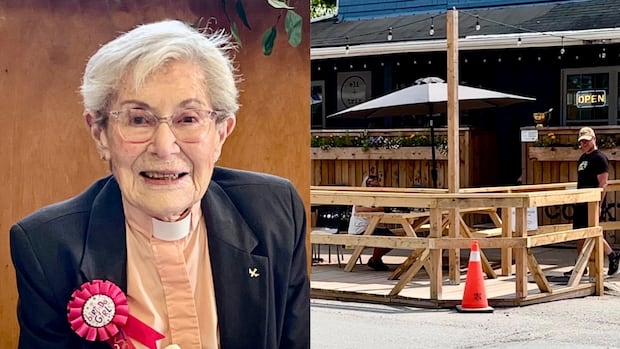More changes in the NS housing benefit scheme are causing consternation among employees in the housing sector

For Leigh MacLean and her colleagues at Welcome Housing in Halifax, the latest changes to Nova Scotia’s housing allowance are the latest in a string of program disappointments.
Last week, housing sector workers across the province were notified of a change to the program that helps low-income Nova Scotians afford rental housing. A two-month grant that allowed people living on the street or living in hotels to apply while looking for a place to rent was removed without notice.
“[Our clients] did everything they should have done,” she said. “They’ve filled out all the forms, they’ve been waiting on someone’s couch or they’re waiting outside in a tent. And they will be called this week to hear that the rule has changed.”
CBC News received a copy of an email from Housing Nova Scotia staff saying that the two-month subsidy people could receive while waiting for a lease or rental unit “has been immediately discontinued.”
The Canada-Nova Scotia Targeted Rent Allowance is a joint provincial-federal program that provides monthly financing to eligible low-income renters or homeowners.
Before the change, MacLean said the two months of payments helped people have some leeway as they searched for a rental. They could have an idea of what their monthly budget would allow, and also use some of the money to pay a security deposit or moving expenses.
At present, customers only receive rent allowance if they can demonstrate that they have signed a lease with a landlord.
She worries where this change will leave people in today’s housing market.
According to the latter rental market report from the Canada Mortgage and Housing Corporation, Halifax saw Canada’s highest year-over-year peak in residential rents between 2021 and 2022, with the average for a two-bedroom unit rising 9.3 percent.
The vacancy rate in Halifax remained around one percent, the second lowest in the country.
Second major change this year
According to the Municipal Affairs and Housing Department, the province currently provides 7,000 rent allowances throughout the province. In Halifax, the monthly payment ranges from $403 to $963.
To qualify, an individual must meet multiple requirements and fall below income thresholds. They must also be in “serious housing need”. That used to mean spending 30 percent of pre-tax income on a home, but that definition quietly changed to 50 percent of one’s pre-tax income in January.
In May, CBC News reported that 1,016 people were still waiting to hear if they would receive housing benefit at the end of March, up from just 55 six months earlier.
“It feels like the most vulnerable people in our community, the ones who struggle the most, that’s where we cut corners,” MacLean said.
Government response
In an email, a spokesman for the provincial housing department confirmed the change to the program, saying customers must now provide a rental agreement before receiving subsidy for their rental.
“During a review, it turned out that there were customers who received a subsidy for two months in advance and then did not receive a lease,” writes spokesperson Krista Higdon. “The change ensures that funding goes to those committed to signing a lease and creates accountability.”
Higdon said the county has “a responsibility to ensure taxpayer dollars are spent responsibly,” and made the change to “ensure program fairness and accountability.”
She said clients can still show landlords they’ve been approved for the subsidy once they sign a lease, so this change shouldn’t stop them from getting their hands on a rental unit.
Higdon said the department is working with eight people currently trying to secure a lease.
MacLean says landlords don’t want to wait for the government to get money, which will put more people on the streets.
“We’ve had those letters in the past and it still takes three or four months for the first payment to come through,” she said.
“Landlords don’t really want to sign a promise, do they?”
Increasing homelessness
The Affordable Housing Association of Nova Scotia tracks the number of people who are homeless in Halifax, with data from service providers including Turning Point Metro, The Salvation Army, Adsum, the YWCA, and the Out of the Cold Shelter.
It says the number of people considered to be actively homeless in the borough increased from 690 in September 2022 to 932 on July 4. Of that total, 689 people identify as “chronically homeless,” meaning they have been away from home for at least six months. or repeatedly during the last six years.



